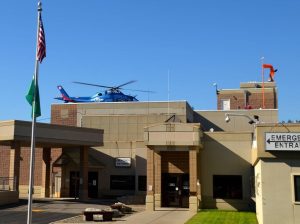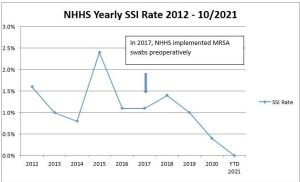Washington Hospital Reduces SSI Rate
Washington Hospital Reduces SSI Rate
Between 2012 to 2015, Newport Hospital and Health Services, a 24-bed rural critical access hospital in Newport, Wash., discovered its surgical site infection (SSI) rates had increased from 1.6% to 2.4%. Although the total number of infections over the four years was only 12, the hospital conducted in-depth analyses and structured brainstorming to find the potential root causes for the increase.
It was determined that the relatively higher infection rates in 2012 and 2015 were associated with post-surgery MRSA infections, one each in 2012 and 2015. A root-cause analysis of these infections revealed that MRSA swabbing and test results in advance of the surgery would have identified MRSA and allowed for pre-surgery treatment, offering the patient an improved chance of an infection-free recovery period. Although the hospital has strong infection practices in our surgery department, the MRSA cases exposed a process gap that it sought to countermeasure with grant funds. Newport Hospital and Health Services developed the following processes and initiatives as part of their SSI reduction plan:
- MRSA swabs are taken at surgical consult 14-30 days before scheduled general surgery. Results are charted, and nasal treatment is performed on positives the morning of surgery with Nozin, an alcohol-based product.
- Surgical patients with a positive MRSA swab before surgery are treated.
- The SSI Quality Team will analyze and track all surgical infections monthly. A root-cause analysis is performed for MRSA infections to understand the efficacy of the nasal treatment method and prophylactic antibiotics.
- Concurrently with the implementation of pre-operative MRSA swabs, the surgical services department utilizes evidenced-based practice techniques to reduce surgical site infections, including:
- Pre-operatively, the surgical area is wiped down with a packet of Chlorhexidine wipes and then a surgical prep with CHX in OR.
- Pre-operatively, total joint patients are wiped down with three packets of Chlorhexidine wipes over the whole body, then the surgical prep in OR is performed with two Chlorhexidine prep sticks.
- Patients undergoing surgery for total joint replacement are talked with a week in advance to remind them not to shave or cut their toenails or do anything that could cause an injury on the operative limb/site.

Newport Hospital and Health Services began using MRSA swabs to identify MRSA-positive patients in 2017. After the first year of pre-operative testing patients for MRSA and the implementation of evidence-based practice techniques, the yearly SSI rate decreased from 1.0% to 0.7%, and in the second year, the SSI rate fell to 0.3%. Even though the hospital had low surgical volumes, the most significant patient safety accomplishment was a 0.0% SSI rate in 2021.
Great work Newport Hospital and Health Services!